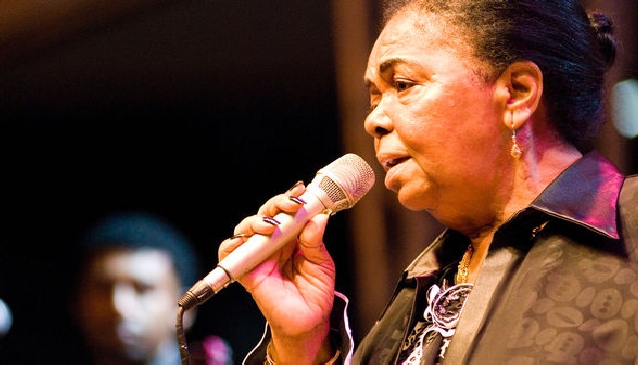Cesaria Evora
Without Evora, the world would have never known of morna, Cape Verde´s signature musical style.
Césaria Evora was a true ambassador of and probably the most celebrated singer ever to come out of Africa. Someone once asked the Barefoot Diva whether she liked to sing without any shoes on because it was more comfortable, and she replied, “I was always a barefoot singer. It´s not a matter of being comfortable. I like to be barefoot, as I always am.”
Evora remained, to the day she sang her last song in her native Sao Vicente, one of the islands that helps form the Cape Verde archipelago, a barefoot singer, who, in a way, represented and gave voice to the hearts of a barefoot land and a barefoot continent, a people so connected to the Earth, to their soil, that shoes seemed to be perhaps an obstacle for her to feel its true vibrations.
When she started singing around the bars in Sao Vicente, Evora had never recorded; she was just a poor girl, right out of an orphanage, who felt that she had to sing the songs of her land. She kept doing it, because people would give her money, although she wasn´t getting paid by bar owners. She became famous around the island by the sheer power of her voice and her musical soul, but she stopped singing in public for 10 years, between 1975 and 1985. This was partly because she felt like her career was going nowhere, and partly because she was “stubborn,” in her own words.


After her years of silence, the next time Evora decided to sing, Cape Verde´s First Minister Pedro Pires saw her, and he was so impressed, that he decided to send Evora, along with a few other singers, to Portugal, to make a record. Evora first came to great acclaim in France, a country with a heavy immigration from Africa, but her fame quickly spread all over the world. She received Grammy awards and Golden records in the US, she performed at the world´s most important stages, she kept living in Sao Vicente with her family, and, till the end of her days, she never put any shoes on to sing her songs.
Without Evora, the world would have never known of morna, Cape Verde´s signature musical style, which combines the wistful longings (or sodade) of a seafaring people with influences from the Portuguese fado and various African rhythms. There are several popular morna singers in the world today who couldn´t have been possible without Evora. In all of her unassuming simplicity and heart-rendering musical interpretations of Cape Verde´s true soul, Evora became an inspirational figure in her homeland, opening doors and inspiring young artists across the archipelago.
Cize, as she was known at home in Sao Vicente, once confessed that her two favourite songs were the delicious Mar Azul and Miss Perfumado. Her late-blooming career was nonetheless prolific because it started when she was nearing the age of 50; she recorded roughly one studio album every couple of years, since the beginning of her career, up until her demise in 2011. The list includes:
La Diva Aux Pieds Nus (1988)
Distino di Belita (1990)
Mar Azul (1991)
Miss Perfumado (1992)
Cesaria (1995)
Cabo Verde (1997)
Cafe Atlantico (1999)
Sao Vicente di Longe (2001)
Voz d'Amor (2003)
Rogamar (2006)
Nha Sentimento (2009)


Each of her albums brought her more and more international acclaim, her songs were featured in Hollywood movies, such as Great Expectations, and an anthology album, including her most popular tracks, was released in 2003.
This small barefoot woman, who was nonetheless an artistic giant, who liked gold jewellery because “you can sell it, if you´re in financial trouble,” who claimed that she never cried for a man, “I just go and get another one,” who would treat any stranger like family, welcoming them into her Mindelo home, provided they “treated her well,” lent her beautiful voice and the power of her heart to a land that had been voiceless for hundreds of years.
In 2012, the airport of Sao Vicente island was renamed Césaria Evora International Airport. Female singers who are continuing in Evora´s tradition today include Fantcha (once Evora´s backup singer), Maya Andrade, Sara Tavares and Lura, among many others.
Images credit: Flickr – Expansao Cultural




